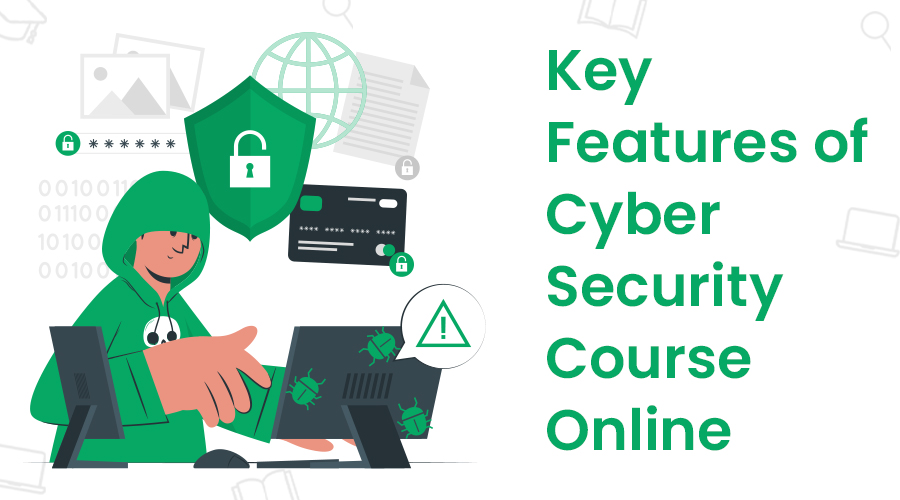Flexible Learning
Online courses offer the convenience of learning at your own pace and schedule, making it ideal for both students and working professionals.













In today’s digital age, the demand for cyber security professionals is skyrocketing. A cyber security course online provides an excellent opportunity for individuals to gain the necessary skills and knowledge to protect information systems from cyber threats.

Flexible Learning
Online courses offer the convenience of learning at your own pace and schedule, making it ideal for both students and working professionals.
Comprehensive Curriculum
Courses typically cover various aspects of cyber security, including network security, data protection, ethical hacking, and risk management.
Interactive Experience
Many programs include virtual labs, simulations, and real-world projects to enhance practical skills.

Convenience
Learn from anywhere without the need for physical attendance.
Practical Skills
Gain hands-on experience that is directly applicable to real-world scenarios.
Career Advancement
Equip yourself with the skills needed to protect digital assets, catering to the rising demand for cyber security experts.
By enrolling in a cyber security course online, you can acquire the expertise needed to tackle contemporary cyber threats and secure a successful career in this high-demand field.

Cyber security involves protecting systems, networks, and data from digital attacks aimed at unauthorized access, alteration, or destruction.
Confidentiality
Keeping information accessible only to authorized users.
Integrity
Preventing unauthorized changes to data.
Availability
Ensuring data and systems are accessible when needed.
Cyber security measures such as firewalls, encryption, and anti-virus software help safeguard personal and business information from threats like malware, phishing, and ransomware.
| Type | Definition | Key Measures |
|---|---|---|
| Network Security | Safeguards networks and data from unauthorized access and breaches. | Firewalls, IDS, VPNs |
| Information Security | Protects the confidentiality, integrity, and availability of data. | Data Encryption, Access Controls, Data Masking |
| Application Security | Ensures applications are protected against vulnerabilities throughout their lifecycle. | Secure Coding Practices, Application Firewalls, Regular Security Testing |
| Operational Security | Manages data security and system operations through processes and policies. | Security Policies, Incident Response Plans, Backup and Recovery Procedures |
| Disaster Recovery and Business Continuity | Plans strategies for recovering from disruptions and ensuring continuous operation. | Disaster Recovery Plans, Business Continuity Strategies, Regular Testing of Recovery Procedures |
| End-User Education | Trains users on potential threats and best practices to prevent security incidents. | Security Training Programs, Phishing Awareness Campaigns, Best Practices for Password Management |
| Course Type | Description | Duration | Typical Institutions |
|---|---|---|---|
| B.Sc in Cyber Security | Undergraduate program covering network security, cryptography, and ethical hacking. | 3 years | Universities, online platforms |
| B.Tech in Cyber Security | Technical degree focusing on cyber security technologies and hands-on experience. | 4 years | Engineering colleges, technical universities |
| Diploma in Cyber Security | Shorter program providing essential skills for quick entry into the workforce. | 1-2 years | Technical institutes, online education providers |
| Certificate Programs | Short-term courses in specific areas like ethical hacking or network security. | Few months | Online platforms, professional training centers |
These courses equip students with the skills needed for a career in cyber security or further education in specialized areas.
| College/University | Program | Duration | Key Features |
|---|---|---|---|
| IIIT Bangalore (in collaboration with UpGrad) | PG Diploma in Cyber Security | 12 months | Designed for working professionals, industry-aligned curriculum, live sessions, mentorship from industry experts |
| Jaro Education (in collaboration with Top Universities) | Executive Certificate Program in Cyber Security | 6-12 months | Short-term, executive-level courses, flexible schedules, industry-recognized certifications |
| Jain University Online | M.Sc in Cyber Security, BCA in Cyber Security | 2 years (Master's), 3 years (Bachelor's) | Flexible online learning, practical assignments, industry-relevant curriculum |
| Amity University Online | B.Sc in Information Technology (Cyber Security), M.Sc in Cyber Security | 3 years (Bachelor's), 2 years (Master's) | Interactive learning modules, virtual labs, industry experts as faculty |
| Subject | Description |
|---|---|
| Introduction to Cyber Security | Basics of cyber threats and defenses. |
| Network Security | Protecting network infrastructure with firewalls, VPNs, and IDS. |
| Ethical Hacking | Techniques for legal security testing and penetration testing. |
| Cryptography | Encryption methods for secure data communication. |
| Information Security Management | Managing and protecting information assets and risk management. |
| Malware Analysis | Identifying and mitigating malicious software. |
| Incident Response | Handling and managing security incidents. |
| Cyber Forensics | Investigating digital evidence for legal purposes. |
| Security Compliance | Understanding regulatory requirements and security frameworks. |
| Application Security | Securing software from vulnerabilities and attacks. |
| Cloud Security | Protecting data and applications in cloud environments. |
| Data Protection and Privacy | Safeguarding personal and sensitive information. |
| Module | Topics Covered |
|---|---|
| 1. Introduction to Cyber Security | Overview of cyber security, key concepts, types of cyber threats, and defenses. |
| 2. Network Security | Network fundamentals, firewalls, intrusion detection/prevention systems, VPNs. |
| 3. Ethical Hacking | Penetration testing, vulnerability assessment, ethical hacking tools and techniques. |
| 4. Cryptography | Encryption algorithms, key management, cryptographic protocols. |
| 5. Information Security Management | Risk management, security policies, compliance frameworks, and governance. |
| 6. Malware Analysis | Types of malware, malware analysis techniques, and mitigation strategies. |
| 7. Incident Response | Incident handling procedures, forensic analysis, and recovery techniques. |
| 8. Cyber Forensics | Evidence collection, digital forensics tools, and investigative techniques. |
| 9. Security Compliance | Regulatory requirements, standards (e.g., GDPR, HIPAA), and compliance practices. |
| 10. Application Security | Secure coding practices, application vulnerabilities, and security testing. |
| 11. Cloud Security | Cloud service models, cloud security challenges, and securing cloud environments. |
| 12. Data Protection and Privacy | Data protection strategies, privacy laws, and securing personal information. |
| Course Type | Eligibility | Duration |
|---|---|---|
| Bachelor's Degree | 12th grade with Science/Math background | 3-4 years |
| Master's Degree | Bachelor's degree in relevant field | 1-2 years |
| Diploma | 12th grade, basic IT knowledge beneficial | 1-2 years |
| Certificate Programs | No specific prerequisites | Few months to 1 year |
| PG Diploma | Bachelor's degree, work experience may be required | 1 year |

Research and Choose a Program
Identify the course that fits your career goals and educational background.
Check Eligibility
Review the eligibility criteria for the chosen program (e.g., educational qualifications, work experience).
Gather Required Documents
Prepare necessary documents such as educational certificates, ID proof, and resume.
Submit Application
Fill out the online application .
Entrance Exam (if applicable)
Some programs may require an entrance exam or assessment.
Application Fee
Pay the application fee, if applicable, through the institution’s online payment portal.
Interview (if applicable)
Attend an interview or counseling session if required by the program.
Receive Admission Offer
Await the admission offer or acceptance letter from the institution.
Enroll and Pay Fees
Complete the enrollment process by paying the course fees and submitting any additional required documents.
Begin the Course
Access course materials, attend online classes, and start your learning journey.












